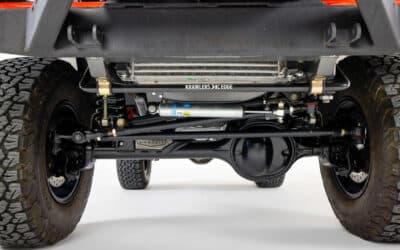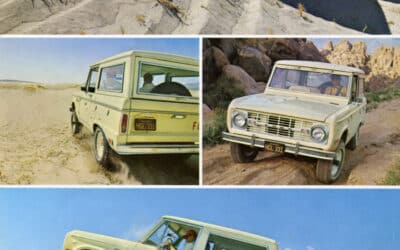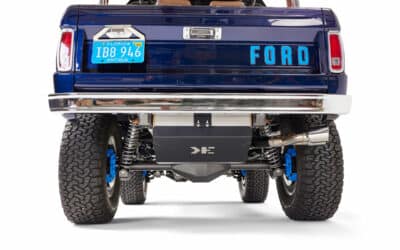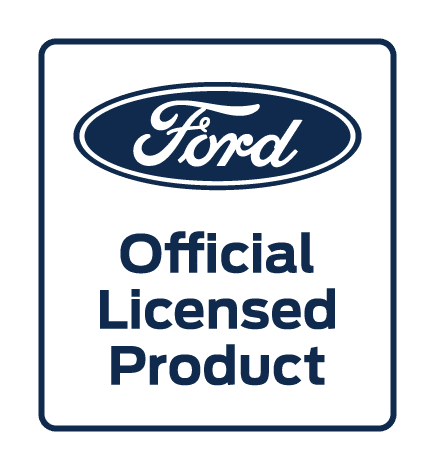There’s something timeless and captivating about old Ford trucks. Their rugged design, powerful engines, and iconic status have made them a favorite among collectors and enthusiasts alike. In this post, we’ll take you on a journey through the history of these remarkable trucks, showcasing their evolution from humble beginnings to modern-day icons. We’ll also dive into the world of restoring and customizing these old Ford trucks, as well as provide tips for buying and maintaining your very own classic Ford. Let’s explore the rich heritage and enduring appeal of these American automotive legends.
Key Takeaways
- Explore the evolution of Ford F-Series trucks from 1917 to present day
- Examine iconic classic models like the 1965 F-100, 1967 Ranger and 1973 Highboy
- Learn tips for restoring, customizing and maintaining your old Ford truck
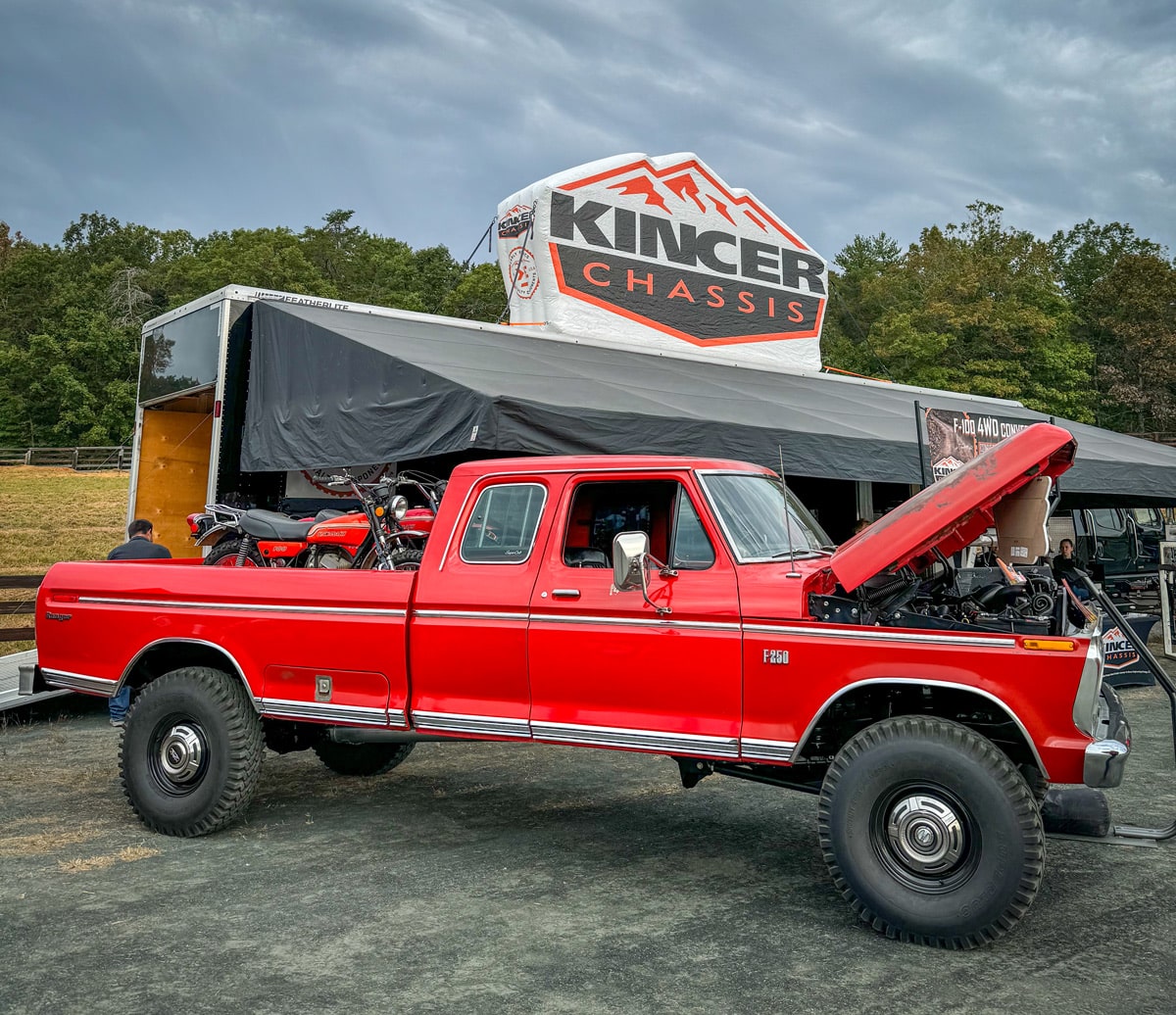
Evolution of the Ford F-Series: A Timeline
The Ford F-Series has a long and storied history, dating back to the early 20th century when Ford Motor Company introduced the Model TT, its first Ford F Series truck. Since then, the F-Series has evolved through fourteen generations, with each new iteration bringing fresh innovations and design updates. Today, Ford F-Series trucks continue to be a staple on roads across America and around the world, with the F-150 consistently ranking as the best-selling truck in the United States. This ford truck history is a testament to the enduring appeal and quality of these vehicles.
A full understanding of the F-Series’ impact comes from tracing its roots and examining the significant milestones along its remarkable journey. We’ll examine the evolution of the Ford F-Series, from inception with the early Model TT and Model AA, to the current 14th generation.
Early Beginnings: Model TT and Model AA
The origins of Ford trucks can be traced back to the introduction of the Model TT in July 1917. Based on the Model T car, the Model TT was Ford’s first foray into the world of pickup trucks, offering a one-ton payload capacity. Despite its modest sales numbers during its inaugural year (2019 units sold), the Model TT laid the foundation for Ford’s future success in the truck market.
Following the Model TT, Ford continued to innovate with the introduction of the Model AA and Model BB trucks, both being two wheel drive models. These successors built upon the foundation laid by the Model TT, achieving similar levels of success and eventually leading to the birth of the iconic F-Series. In 1928, Ford introduced the Model TT truck to 1.3 million customers, and by the time production of the Model 50 pickup ceased in 1941, Ford had produced over four million trucks.
First to Sixth Generation (1948-1979)
The first generation of the Ford F-Series was introduced in 1948, marking a significant departure from Ford’s previous car and truck designs. This new line of trucks featured increased dimensions, improved engines, and an updated chassis. The first generation F-Series also introduced the now-iconic F-100, which remains a favorite among collectors and enthusiasts to this day.
As the F-Series progressed through its second to sixth generations (spanning from 1953 to 1979), Ford continued to refine and improve its trucks, including the introduction of four wheel drive options. Key design changes during this period included:
- The introduction of the “Twin I-Beam” front suspension in the fourth generation
- Increased cabin dimensions and additional trim levels in the fifth and sixth generations
- The introduction of front disc brakes
- The use of galvanized steel for increased durability
Throughout these generations, Ford offered a wide range of engine options and creature comforts for F-Series trucks. From the reliable Mileage Maker inline-6 engines to the powerful Y-block and FE V8s, these trucks provided the power and versatility that truck buyers craved. Combined with available options like automatic transmissions, power brakes, and power steering, the first to sixth generations of the F-Series laid the groundwork for the success and popularity the trucks enjoy today.
Seventh to Fourteenth Generation (1980-Present)
Starting in 1980, Ford embarked on a complete redesign of the F-Series for the seventh generation, marking the first major overhaul since the 1965 model year. This new direction for the F-Series brought with it a host of updates and improvements, including more fuel-efficient engines, updated body panels, and redesigned interiors. The seventh generation also saw the discontinuation of the Flareside bed design, with all models produced featuring Styleside beds.
From the eighth generation onward, the Ford truck lineup, specifically the F-Series, continued to evolve and adapt to the changing needs of truck buyers. Notable additions during this period include the introduction of the fully electric F-150 Lightning and the high-performance F-150 Raptor models. As the F-Series moved through its fourteenth generation, it has maintained its position as America’s best-selling truck line, a testament to the enduring appeal of these classic workhorses.
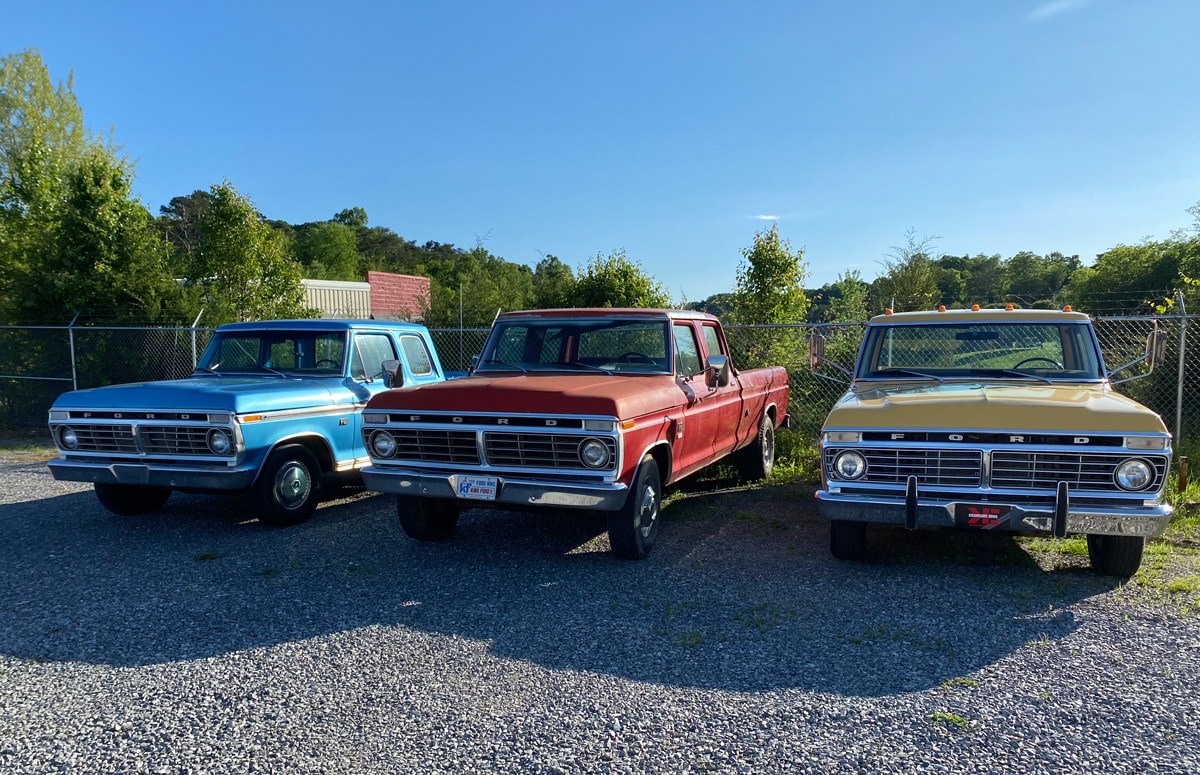
Iconic Old Ford Trucks: Showcasing Classic Models
While the F-Series has evolved considerably over the years, certain classic Ford trucks have left an indelible mark on the automotive landscape. The 1965 Ford F-100, 1967 Ford F-100 Ranger, and 1973 Ford F-250 Highboy are just a few examples of timeless designs that continue to captivate truck enthusiasts.
We’ll examine these iconic models and uncover what sets them apart.
1965 Ford F-100
The 1965 Ford F-100 is a highly sought-after classic truck that boasts:
- A unique design
- A range of robust engine options
- A widened front that seamlessly integrates the cab and front fenders
- A hood with a clamshell design that adds an unmistakable touch of character to the vehicle
- Power from the same OHV sixes and V8s found in other Ford models of the era
The 1965 F-100 provides the perfect blend of style and performance.
Today, a well-preserved 1965 Ford F-100 can fetch between $10,000 and $20,000, making it an attractive investment for collectors and enthusiasts alike.
1967 Ford F-100 Ranger
The 1967 Ford F-100 Ranger represents the perfect balance of style and versatility. Featuring new, more defined styling lines, an increased cab size, and a variety of engine options, the 1967 F-100 Ranger is a favorite among classic Ford truck collectors. Its wider, sturdier frame and range of engine options, including the 223 and 262 CID Mileage Maker inline 6 cylinders, 292 CID Y-block V8, and the more modern 335 and 385 series engines, make it a powerful and capable workhorse.
The current market value for a 1967 Ford F-100 Ranger in decent condition is estimated to be between $20,000 and $25,000.
1973 Ford F-250 Highboy
The 1973 Ford F-250 Highboy is a full-size pickup truck with a dedicated following among truck enthusiasts. Known for its rugged design and exceptional 4×4 capabilities, the Highboy is a force to be reckoned with both on and off the road.
In 1973, Ford made significant improvements to the F-250, including:
- The use of galvanized sheet metal
- Zinc-coated steel
- A zinc-rich primer for rust protection
- Relocating the fuel tank out of the cab for improved safety
Today, a 1973 Ford F-250 Highboy in decent condition can fetch an estimated $7,900.
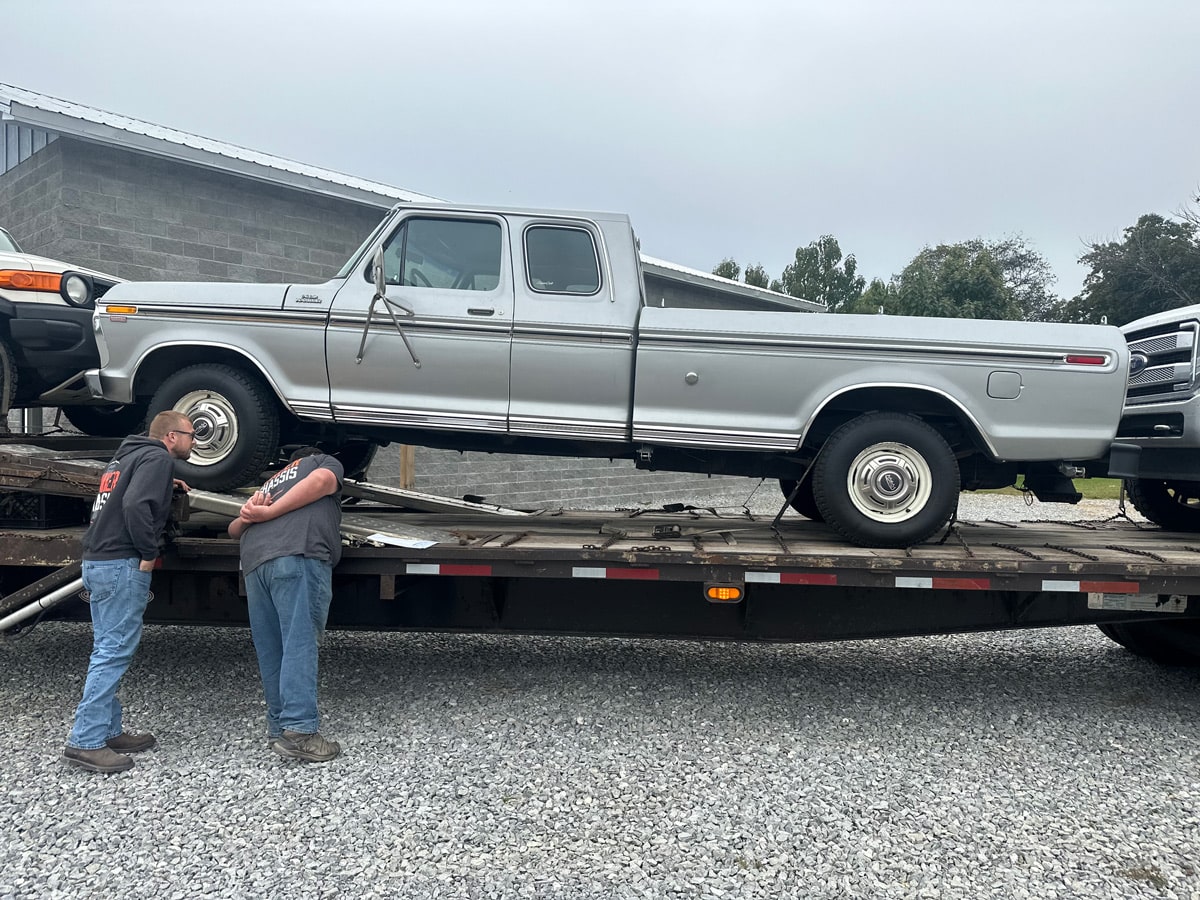
Restoring and Customizing Classic Ford Trucks
For many classic Ford truck enthusiasts, the joy of ownership goes beyond simply driving these vehicles. The process of restoring and customizing an old Ford truck is a labor of love that allows owners to breathe new life into their prized possessions. From sourcing hard-to-find replacement parts to undertaking popular modifications and upgrades, there’s a lot to consider when it comes to restoring and customizing a classic Ford truck.
We’ll provide valuable tips and insights for those ready to embark on this rewarding endeavor.
More than just a truck, it’s a statement. Discover the customization options of lifted old Ford trucks.
Finding Replacement Parts
When it comes to restoring a classic Ford truck, finding the right replacement parts can be a daunting task. Fortunately, there are a number of resources available to help you track down the components you need. Online retailers such as:
You can find a wide selection of parts, including the Ford blue oval emblem, for classic Ford trucks
Additionally, salvage yards can be a treasure trove of rare and hard-to-find parts for older vehicles. When searching for replacement parts, it’s important to assess the availability, cost, and quality of the parts, as well as verifying their compatibility with your truck.
Popular Modifications and Upgrades
There are countless modifications and upgrades available for classic Ford trucks, allowing owners to truly make their vehicles their own. Popular modifications include:
- Engine swaps
- Suspension upgrades
- Interior upgrades
- Exterior upgrades such as custom paint jobs
When considering modifications, it’s important to strike a balance between preserving the originality of the truck and making changes that will enhance its performance or aesthetics.
Research the various options available, and be sure to consult with a qualified mechanic who specializes in classic Ford trucks before undertaking any major modifications.
If you find a 2WD Ford F-Series truck from the year 1965 to 1979 and you want to convert it to 4WD – check out our 2WD to 4WD conversion kit for vintage Ford trucks..
Preserving Originality
While it can be tempting to make extensive modifications to a classic Ford truck, it’s important to remember the value of preserving its originality. Keeping the truck as close to its original condition as possible not only helps to retain its historical value but also ensures that the vehicle remains a true reflection of its era.
To maintain the originality of a classic Ford truck, try to use original parts and components whenever possible and avoid making unnecessary modifications. If changes are made, be sure to document them and, if possible, ensure that they are reversible. This will help to protect the truck’s value and appeal to future collectors.
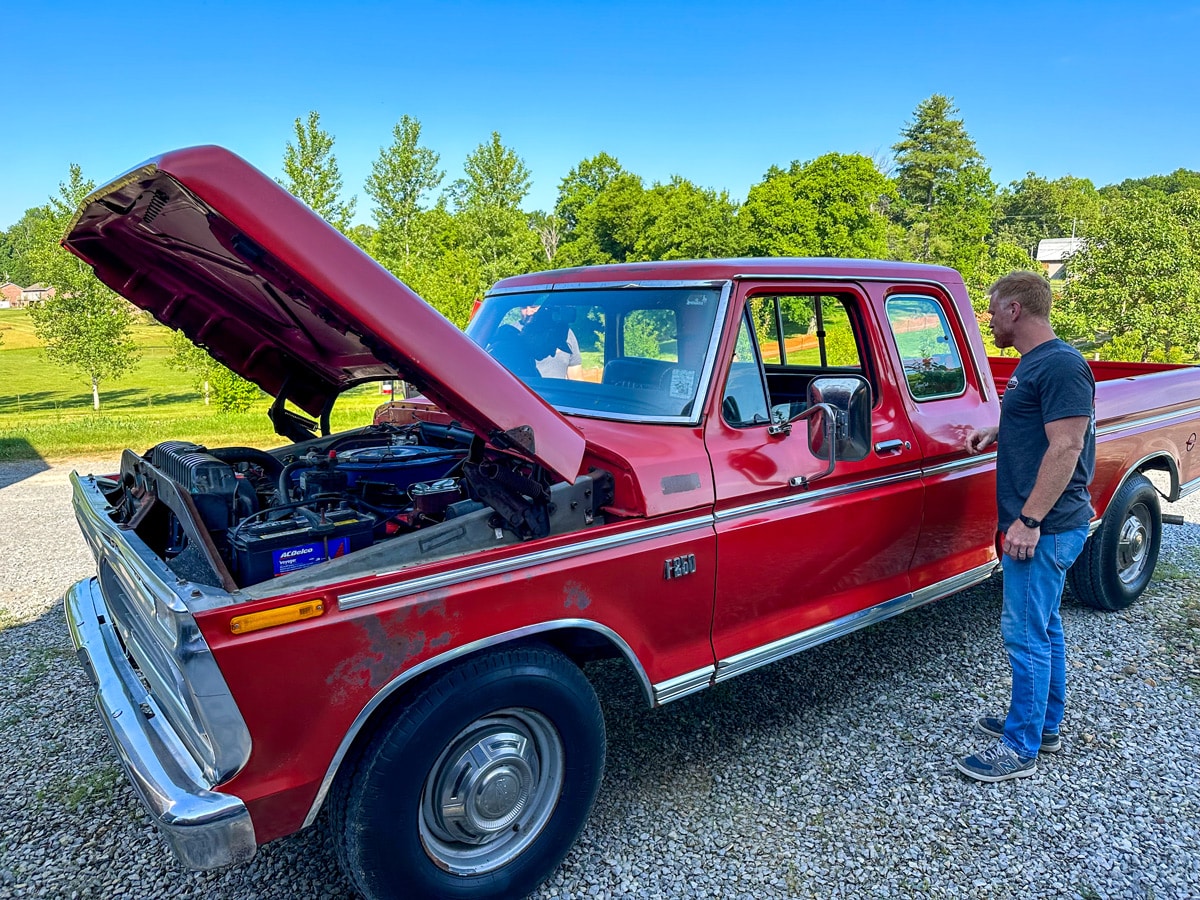
Buying an Old Ford Truck: What to Consider
If you’re in the market for a classic Ford truck, there are several factors to consider before making a purchase. Evaluating the condition of the truck, addressing rust and corrosion concerns, understanding engine options, and keeping an eye on market trends can all help to ensure that you find the perfect old Ford truck for your needs.
This section offers guidance to help you through the process of purchasing a classic Ford truck.
Evaluating the Condition
When assessing the condition of a classic Ford truck, it’s important to carefully inspect the following:
- Body, frame, and mechanical components
- Signs of rust, particularly in areas such as the underbody, frame, and body panels
- Engine, transmission, brakes, and suspension for any potential issues or signs of wear
- Take the truck for a test drive to evaluate its performance and listen for any unusual noises
- Interior for signs of wear and tear, and ensure that all features and controls are working properly
Finally, if possible, look for any available documentation, such as maintenance records or build sheets, to gain further insight into the truck’s history and condition. Check out this list of 10 things to look for when buying a Ford Bronco. While the Bronco and F Series aren’t the same, almost everything from that era will need the same things checked!
Rust and Corrosion Concerns
Rust and corrosion are common concerns when purchasing an old Ford truck. While aluminum components in more recent Ford trucks are less susceptible to corrosion than steel, they may still corrode over time. Carefully examine the truck for any signs of rust, particularly in areas like the underbody, frame, and body panels. If rust is present, consider the extent of the damage and the costs associated with repairing or replacing affected parts. Remember that addressing rust and corrosion issues early on can help to preserve the value and longevity of your classic Ford truck.
Engine Options and Performance
Classic Ford trucks are equipped with a wide range of engine options, which can have a significant impact on the truck’s performance and value. Some engine options to consider are:
- Inline-6 engines: known for their reliability and fuel efficiency
- V8 engines: offer greater power and torque
- Flathead engine: a classic option highly sought after by collectors
When purchasing a classic Ford truck, it’s important to research the various engine options available and consider what type of performance and value you’re looking for in your truck.
Newer engine options can include engines like the 7.3 Godzilla from a new Super Duty line of trucks or the 5.0 Coyote Engine.
Pricing and Market Trends
Understanding the current market for classic Ford trucks can help you determine a fair price for a specific model. The market for vintage Ford trucks has seen a steady increase in recent years, with some examples selling for as low as $7,000 and as high as $32,000.
There has been a surge in popularity and value for the market of vintage pickup trucks, including Ford trucks. Additionally, used Ford F-150 pickup prices have experienced a significant increase since 2019. By staying informed on market trends and pricing, you can ensure that you’re making a wise investment when purchasing a classic Ford truck.
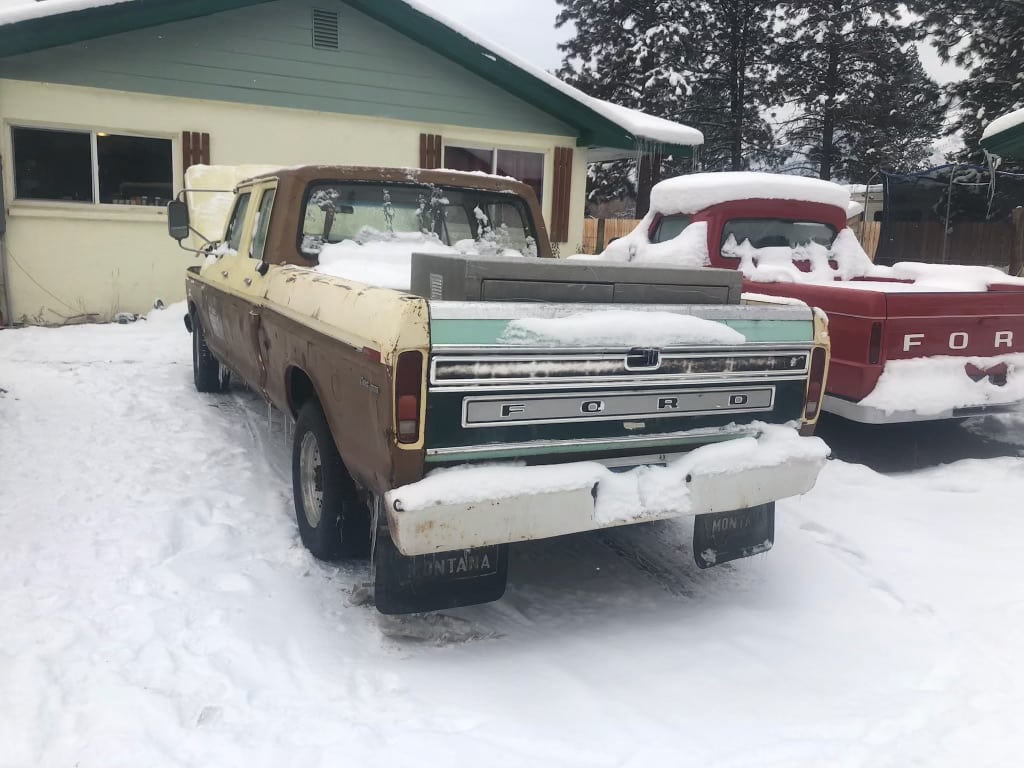
Old Ford Trucks in Pop Culture
From movies and television shows to famous custom builds, old Ford trucks have made a lasting impact on popular culture. Their rugged design and powerful engines have made them a favorite among collectors and enthusiasts alike.
We’ll highlight some of the most memorable appearances of classic Ford trucks in film, television, and in unique custom builds by famous owners.
Movies and Television Shows
Classic Ford trucks have made their mark on the big and small screens alike. Notable films featuring old Ford trucks include:
- “The Fast and the Furious” (1999)
- “Mad Max: Fury Road”
- “The Dukes of Hazzard”
- “The Rockford Files”
These trucks have become iconic symbols of American culture, often seen as symbols of strength, resilience, and freedom.
Their presence in popular culture is a testament to their enduring appeal and the impact they have had on generations of truck enthusiasts.
Famous Owners and Custom Builds
Classic Ford trucks have been showcased in custom builds by renowned owners such as Jay Leno and Chip Foose. These one-of-a-kind creations not only highlight the timeless design of these trucks but also demonstrate the incredible craftsmanship and creativity that go into restoring and customizing these vehicles.
From engine swaps to suspension upgrades, these famous builds showcase the endless possibilities of what can be done with a classic Ford truck.
Check out this 5.2-Liter Supercharged 1968 Ford Bronco Wagon we made just for Jay Leno!
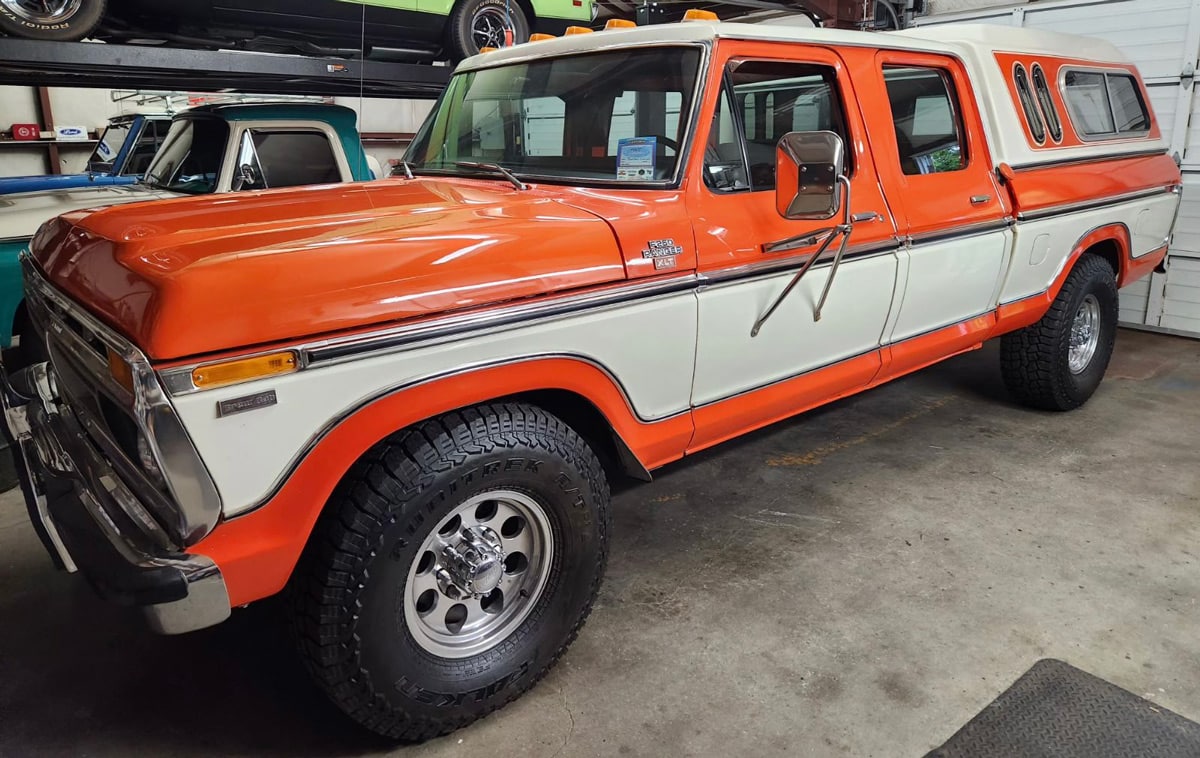
Maintaining and Caring for Your Classic Ford Truck
Owning a classic Ford truck is a rewarding experience, but it also comes with the responsibility of ensuring that the vehicle is properly cared for and maintained. From regular maintenance to storage considerations and insurance and registration, there’s a lot to think about when it comes to caring for your classic Ford truck.
This section offers helpful tips and information to keep your truck in optimal condition and maintain its value over time.
Regular Maintenance
Regular maintenance is essential for keeping your classic Ford truck in good working order and ensuring its optimal performance. A basic maintenance schedule should include:
- Washing and waxing the truck
- Regular oil changes
- Replacing air filters
- Checking and adjusting brakes
- Rotating tires
- Conducting an annual safety inspection for vehicles registered as ‘Classic’
By staying on top of routine maintenance tasks, you can help prevent costly repairs down the road and ensure that your truck remains a reliable and enjoyable part of your life.
Storage Considerations
Proper storage is crucial for protecting your classic Ford truck from the elements and preserving its value. When storing your truck, consider factors such as temperature, humidity, and security. Ideally, the truck should be kept in an enclosed space, such as a garage or carport, to shield it from the elements.
In addition, make sure to start and drive the truck regularly to keep the engine and other components in optimal condition. Taking the time to properly store and care for your truck will help to ensure its longevity and maintain its value for years to come.
Insurance and Registration
Ensuring that your classic Ford truck is properly insured and registered is an important aspect of responsible ownership. Insurance requirements for classic trucks may vary depending on the provider, but generally, insurers require classic trucks to have a minimum value of approximately $3,500 and to be in good working order.
Registration requirements may vary by state, so it’s important to contact your local Department of Motor Vehicles for further information.
Old Ford Trucks: A Community of Enthusiasts
The world of classic Ford trucks is more than just a collection of vehicles – it’s a community of passionate enthusiasts who share a love for these timeless machines. From clubs and organizations to events and online forums, there are countless ways for classic Ford truck owners to connect, share knowledge, and celebrate their shared passion.
We’ll dive into the dynamic community of classic Ford truck enthusiasts and the various ways they join forces to celebrate these iconic vehicles.
Clubs and Organizations
There are numerous clubs and organizations dedicated to classic Ford truck enthusiasts, such as the Classic Ford Truck Club, Ford Truck Enthusiasts, and the Ford F-Series Owners Club. These clubs offer a wide range of resources, activities, and events for members, allowing them to connect with like-minded individuals, learn from one another, and share their love for these classic vehicles.
Joining a club or organization can provide valuable networking opportunities, access to restoration resources, and the chance to attend events and shows dedicated to classic Ford trucks.
Events and Showcases
Classic Ford truck enthusiasts can attend a variety of events and showcases where they can gather and display their vehicles. Some of the most popular events include the Grand National F-100 Ford Reunion, Classic Truck Nationals, and the Annual Ford Nationals Select Display. These events provide an opportunity for truck owners to showcase their vehicles, meet fellow enthusiasts, and participate in activities such as car shows, swap meets, and truck rallies.
Attending events and showcases is a great way to immerse yourself in the classic Ford truck community and celebrate your passion for these iconic vehicles.
Online Forums and Social Media
In addition to clubs, events, and showcases, online forums and social media platforms offer another way for classic Ford truck enthusiasts to connect and share information. Popular forums such as Ford Truck Fanatics, Ford-Trucks.com Forums, and Ford Full Size provide a wealth of knowledge and resources for truck owners, while social media platforms like Facebook and Instagram allow enthusiasts to share photos, stories, and tips with fellow fans.
By engaging with the online community, you can expand your knowledge and appreciation for classic Ford trucks while forging new connections with fellow enthusiasts.
Summary
From their humble beginnings with the Model TT to their enduring popularity today, classic Ford trucks have left an indelible mark on the automotive world. As we’ve explored throughout this blog post, these iconic vehicles have a rich history, a dedicated community of enthusiasts, and a timeless appeal that continues to captivate collectors and fans alike. Whether you’re in the market for a classic Ford truck, looking to restore or customize your own, or simply interested in learning more about these legendary vehicles, the world of classic Ford trucks offers a wealth of opportunities for adventure, creativity, and connection. May the road ahead be filled with the rumble of V8 engines and the shine of freshly polished chrome.
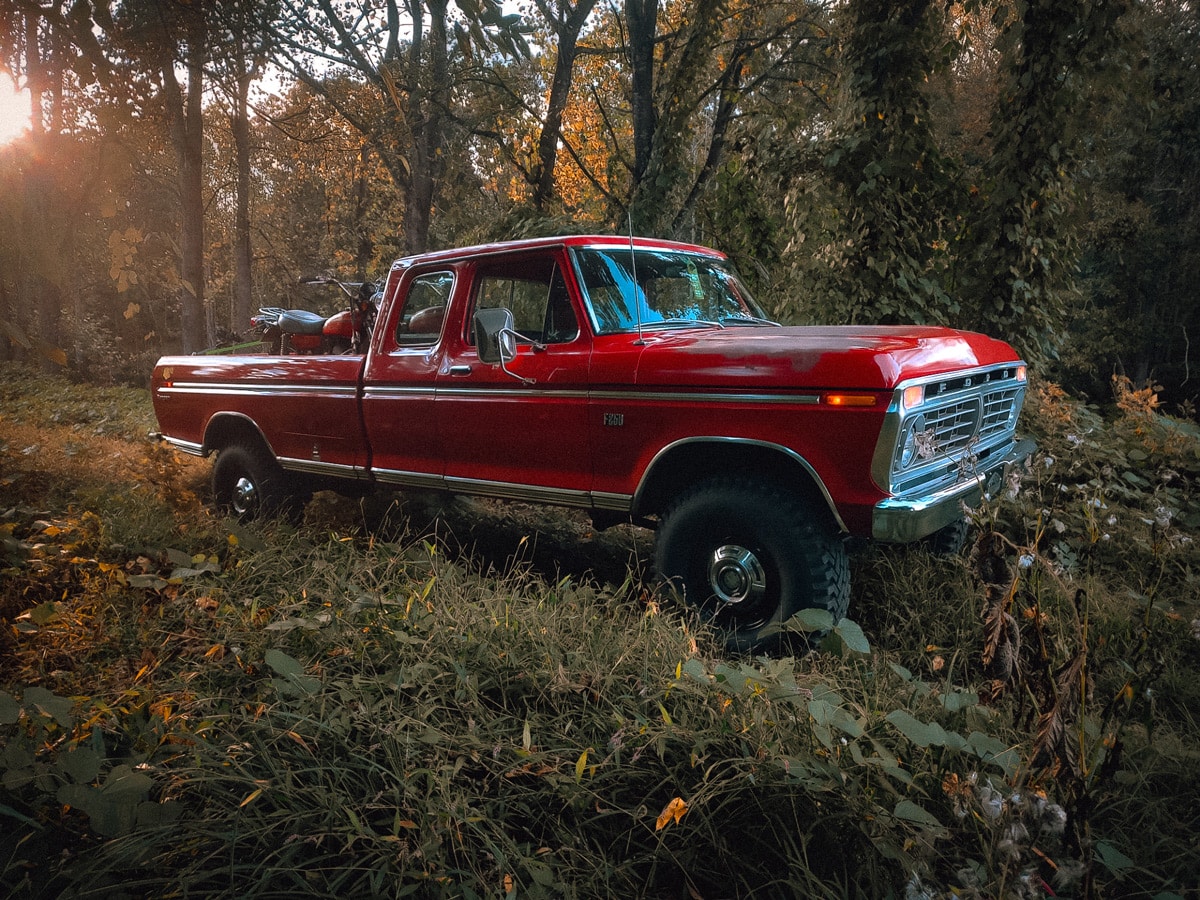
Frequently Asked Questions
What are the old Ford trucks called?
The first Ford trucks were designated Model TT from 1917 to 1928, Model AA from 1929 to 1932, Model BB from 1933 to 1934, the Model 50 in 1935, the Model 67 in 1936, and no truck-specific alphanumeric designation from 1937 to 1947. The first-generation F-Series pickup (known as the Ford Bonus-Built) was then introduced in 1948, becoming the iconic Ford F-1, F-100, and bestselling F-150 models over the years.
What are 70s Ford trucks called?
Ford trucks from the 70s are commonly referred to as the sixth generation of Ford F-Series trucks, with the regular cab F-350 being introduced with a “Styleside” bed in 1973.
What are 90s Ford trucks called?
The Ford F-Series from 1992 to 1998 is often referred to as the 90s Ford trucks.
What was the last year of the F 100?
The last year the F-100 was produced was 1983, lasting for seven generations and seeing significant changes over its lifetime. It was America’s Favorite Pickup, with nearly a million sold per year as a true workhorse.
What is the Ford F-Series?
The Ford F-Series is a popular series of light-duty trucks produced and distributed by Ford, providing an essential part of its truck lineup.
What is a highboy Ford?
The term “Highboy” is often used to refer to certain Ford F-250 4×4 pickup trucks manufactured between the years 1967 to 1977. These trucks are known for their distinctive appearance which sets them apart from standard trucks. Here are some key points about Highboy Ford trucks:
- Designation and Features: The Highboy designation refers to the Ford F-250 trucks, specifically those optioned with four-wheel drive during the mentioned period. They are appreciated for their rugged features and easy handling, making them a notable choice among truck enthusiasts.
- Origin of the Term: Interestingly, the term “Highboy” is not an official Ford designation but rather a nickname used by enthusiasts. The name likely originates from these trucks’ higher stance due to their four-wheel-drive setup and possibly the use of a divorced transfer case. The early 4×4 pickups were conversions of a 2WD chassis, and it was simpler and more cost-effective to use the original 2WD transmission rather than designing an adapter for the conversion.
- Popularity: Highboy Ford trucks have become highly sought-after vintage vehicles, with their unique design and capability continuing to attract truck enthusiasts even many years after production ceased.
These factors contribute to the enduring popularity and mystique surrounding the Highboy Ford trucks among automotive enthusiasts and collectors.

